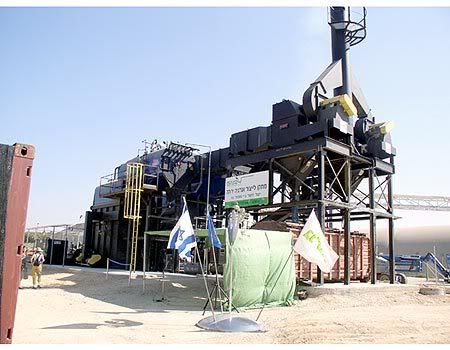Industrial steam from biomass: green, efficient and cheap

Many industries think the use of biomass as a substitute for fossil fuels makes no economic sense yet. For the time being, bioenergy is too expensive and not enough mechanisms to reward its CO2 neutrality are in place, or so they think. Nothing is further from the truth. Depending on local circumstances and the availability of feedstock, many forms of bioenergy - from biogas in agro-industry to co-firing of biomass for the production of green steel - definitely contribute to lowering direct production costs or secondary costs such as those derived from waste management. When the system of carbon trading as it exists in Europe today, becomes generalized, the economic arguments in favor of biomass and biofuels become even stronger.
An example of such a successful use of green energy in a competitive and mature industry comes from the Kibbutz Galam factory in Israel. The factory recently opened a facility (picture) to generate steam for industrial use fuelled by burning a solid biofuel consisting of wood chips from tree trimmings. And contrary to common perception, the environmentally-friendly plant delivers energy that is 25 percent cheaper than its polluting counterparts.
The facility, founded by GNRY Ltd. at a cost of USD 7 million, is the first of its kind in Israel. The new, environmentally friendly facility is replacing a system of steam boilers that operated on fossil fuels, which emit carbon monoxide and greenhouse gases. Municipalities and forests in Israel generate excess tree trimmings that, up until now, have had no use and constituted an unsolved problem of biological waste:
 biomass :: bioenergy :: biofuels :: energy :: sustainability :: waste :: wood chips :: steam :: Israel ::
biomass :: bioenergy :: biofuels :: energy :: sustainability :: waste :: wood chips :: steam :: Israel ::The facility in Galam - which is expected to use 25,000 tons of woodchips per year – serves as a breakthrough solution to the problem with additional significant environmental ramifications.
During the facility's inauguration ceremony, Minister of Environmental Protection Gideon Ezra said that "the state of Israel has far to go to reach a progressive policy on recycling. This facility constitutes a shining example of 'green business' and I call on other entrepreneurs to take part in 'green initiatives', for all of our sakes."
More contracts anticipated
GRNY Ltd., a company specializing in green energy projects, built the facility using the BOT method (build, operate, transfer). The facility was manufactured in the US by Hurest Boilers Ltd. and assembled in Israel by a local team trained by the American company.
The facility was built to meet rigorous environmental standards, including regulations by Israel's Ministry of Environmental Protection.
According to GNRY CEO Dan Schneid, in upcoming months, the company is anticipated to sign contracts for two more such facilities in northern and central Israel.
GNRY has been active in engineering projects for five years, but only began dealing with green energy projects a year and a half ago.
At that time, it received an exclusive permit from the American manufacturer of vats in Israel and central Europe, which deals with a variety of energy-related products, including those running on gas, crude oil and, of course, biomass.
 -------------------
-------------------
 Spanish company Ferry Group is to invest €42/US$55.2 million in a project for the production of biomass fuel pellets in Bulgaria.
The 3-year project consists of establishing plantations of paulownia trees near the city of Tran. Paulownia is a fast-growing tree used for the commercial production of fuel pellets.
Spanish company Ferry Group is to invest €42/US$55.2 million in a project for the production of biomass fuel pellets in Bulgaria.
The 3-year project consists of establishing plantations of paulownia trees near the city of Tran. Paulownia is a fast-growing tree used for the commercial production of fuel pellets.









0 Comments:
Post a Comment
Links to this post:
Create a Link
<< Home